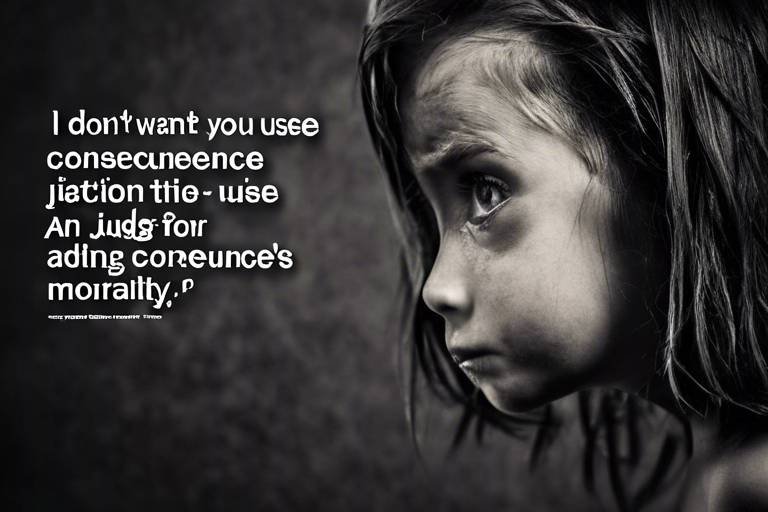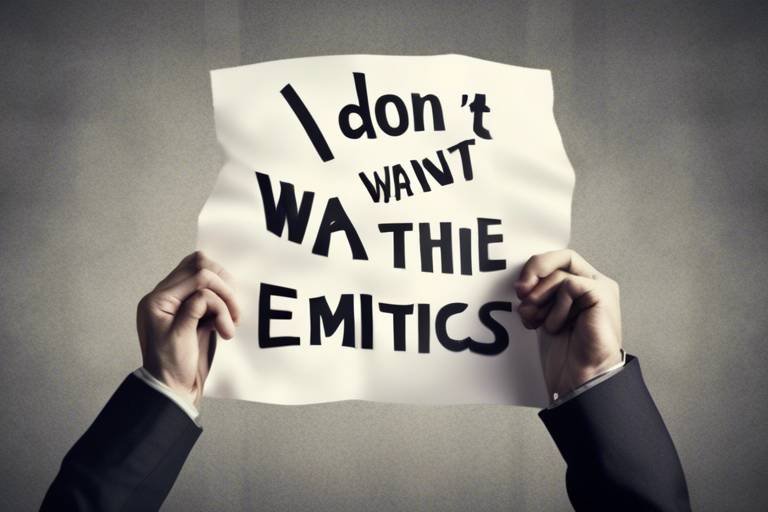Are Consequences the Only Criteria for Judging an Action's Morality?
When it comes to the age-old question of morality, we often find ourselves grappling with a fundamental dilemma: should we judge actions solely based on their consequences? This question is not just a philosophical exercise; it has real-world implications that influence our everyday decisions, from personal choices to public policy. Imagine a scenario where a well-intentioned action leads to disastrous outcomes—does that action become morally acceptable simply because it was meant to do good? Or conversely, what if a decision taken with selfish motives results in a positive outcome? These intricacies in moral judgment highlight the importance of exploring various ethical frameworks beyond mere consequences.
In the realm of moral philosophy, several theories exist that challenge the notion of consequentialism as the sole determinant of moral worth. For instance, deontological ethics emphasizes the importance of duties and rules, suggesting that some actions are intrinsically right or wrong, regardless of their outcomes. This perspective invites us to consider the intentions behind actions and the principles that guide them. Similarly, virtue ethics shifts the focus from actions and consequences to the character of the moral agent, arguing that a virtuous person will naturally make ethical decisions. This raises an intriguing question: can we truly encapsulate the complexity of morality by merely evaluating the end results of our actions?
To better understand this debate, let's break down the main ethical theories that contribute to our understanding of morality. Each of these frameworks offers unique insights and challenges, creating a rich tapestry of moral thought:
| Theory | Key Focus | Strengths | Weaknesses |
|---|---|---|---|
| Consequentialism | Outcomes of actions | Clear decision-making process | Can justify harmful actions |
| Deontology | Duties and rules | Emphasizes moral principles | May ignore consequences |
| Virtue Ethics | Character of the moral agent | Focus on moral development | Subjective and vague |
As we navigate this moral landscape, it becomes evident that a singular focus on consequences can lead to ethical dilemmas that challenge our understanding of right and wrong. The real world is filled with gray areas, where the lines between good and bad are often blurred. Therefore, while consequences are undoubtedly important, they should not be the only lens through which we evaluate moral actions. Instead, a more holistic approach that incorporates intention, character, and the broader context of actions might provide a more accurate reflection of moral truth.
- What is consequentialism? Consequentialism is an ethical theory that judges the morality of an action based on its outcomes. The better the consequences, the more morally acceptable the action.
- How does deontological ethics differ from consequentialism? Deontological ethics focuses on the inherent rightness or wrongness of actions, regardless of their outcomes, emphasizing the importance of following moral rules and duties.
- What is virtue ethics? Virtue ethics emphasizes the character and intentions of the moral agent, suggesting that a morally upright person will naturally make good decisions.
- Can an action be morally acceptable if it has harmful consequences? This is a contentious issue. Some argue that the intention behind the action matters, while others insist that harmful outcomes cannot be justified.

Understanding Moral Philosophy
Moral philosophy, or ethics, is a fascinating field that dives deep into the questions of right and wrong, good and evil. It’s like a treasure map guiding us through the complexities of human behavior and societal norms. At its core, moral philosophy seeks to answer some fundamental questions: What makes an action right or wrong? Are we guided by our intentions, the outcomes of our actions, or perhaps a mix of both? To navigate this intricate landscape, several ethical theories have emerged, each offering unique insights and frameworks for evaluating moral actions.
Among the most influential theories are consequentialism, deontology, and virtue ethics. Each of these frameworks provides a different lens through which to view morality, much like how a prism reveals a spectrum of colors. Understanding these theories is essential for anyone looking to grasp the nuances of moral judgment. Let's break down these three pillars of moral philosophy:
| Theory | Focus | Key Question |
|---|---|---|
| Consequentialism | Outcomes of actions | What are the consequences? |
| Deontology | Duties and rules | What is my duty? |
| Virtue Ethics | Character and intentions | What kind of person should I be? |
Consequentialism operates on the premise that the morality of an action is determined by its outcomes. If the results are beneficial, then the action is deemed moral. This approach is appealing because it seems practical and straightforward; however, it can lead to troubling conclusions, especially when the greater good comes at the expense of individual rights.
On the other hand, deontological ethics emphasizes the importance of rules and duties. It argues that some actions are inherently right or wrong, regardless of the consequences. Picture a train track with a switch: the deontologist would argue that pulling the switch to divert the train, even to save lives, could be morally wrong if it means actively causing harm to someone else. This perspective can be quite rigid, but it underscores the importance of moral principles and integrity in our decision-making.
Finally, virtue ethics shifts the focus from actions to the character of the moral agent. It asks us to consider not just what we do, but who we are. Are we cultivating virtues like honesty, courage, and compassion? This approach encourages personal growth and moral development, suggesting that a good person will naturally make good choices. However, this theory is not without its criticisms; some argue it lacks clear guidelines for action and can be subjective.
In summary, moral philosophy offers a rich tapestry of theories that challenge us to think critically about our ethical beliefs. By exploring the complexities of these frameworks, we can better understand the moral dilemmas we face in our daily lives. So, the next time you find yourself pondering a tough decision, remember that the path to moral clarity is often winding and requires thoughtful consideration of various ethical perspectives.

Consequentialism Explained
Consequentialism is a fascinating branch of moral philosophy that asserts the morality of an action is determined solely by its outcomes. In simpler terms, it’s all about the results. If the outcome is positive, then the action is deemed morally right; if it’s negative, then the action is considered wrong. This perspective can be quite appealing, as it offers a straightforward way to evaluate ethical dilemmas. After all, who wouldn’t want to make decisions that lead to the best possible results for the greatest number of people?
However, while the allure of consequentialism is clear, it also raises some critical questions. For instance, what happens when the consequences of an action are beneficial for some but harmful for others? This is where the complexities of moral judgment come into play. To better understand consequentialism, let's break down its core principles, strengths, and weaknesses.
At its core, consequentialism can be summarized with a few key tenets:
- Outcome-Oriented: The primary focus is on the results of actions rather than the actions themselves.
- Impartiality: Every individual's well-being is considered equally when evaluating outcomes.
- Maximization: The goal is to maximize positive outcomes and minimize negative ones.
One of the most significant strengths of consequentialism is its practical approach to moral decision-making. In many real-life situations, such as public policy or healthcare, the consequences of actions can be measured and evaluated, allowing for informed choices that aim for the greater good. For example, when considering a new healthcare policy, a consequentialist would analyze how many lives could be saved or improved and weigh that against the costs involved.
But it’s not all sunshine and rainbows. Consequentialism also has its fair share of criticisms. One major concern is that it can justify morally questionable actions if they lead to a perceived greater good. For instance, if sacrificing one person could save a hundred, a strict consequentialist might argue that the sacrifice is justified. This raises ethical dilemmas that challenge our intuitions about right and wrong. Can we really accept that some lives can be traded for the benefit of others?
Moreover, the focus on outcomes can sometimes lead to a neglect of the means used to achieve those outcomes. This is particularly troubling when we consider actions that may be legal or deemed acceptable but are fundamentally unjust. For instance, consider a government policy that benefits the majority but systematically oppresses a minority. A consequentialist might argue that the policy is justified due to its overall benefits, yet many would find this morally reprehensible.
In summary, while consequentialism provides a clear framework for evaluating moral actions based on outcomes, it also invites a host of ethical questions that challenge its validity as the sole criterion for morality. As we delve deeper into moral philosophy, it becomes evident that a more nuanced approach may be necessary to fully grasp the complexities of ethical decision-making.
- What is the main principle of consequentialism? Consequentialism holds that the morality of an action is determined by its outcomes.
- How does consequentialism differ from deontological ethics? While consequentialism focuses on the results of actions, deontological ethics emphasizes rules and duties regardless of the outcomes.
- Can consequentialism justify harmful actions? Yes, critics argue that consequentialism can justify harmful actions if they lead to a greater good.
- How is consequentialism applied in real life? It is often used in public policy, healthcare decisions, and ethical dilemmas where outcomes can be measured.

Utilitarianism as a Key Branch
Utilitarianism stands out as a significant branch of consequentialism, and it's all about the **outcomes** of our actions. Imagine a world where every decision you make is weighed against a scale of happiness and suffering. Sounds simple, right? The central idea behind utilitarianism is that the **morality** of an action is determined by its ability to produce the greatest good for the greatest number of people. This principle, often summarized as "the ends justify the means," invites us to consider not just what we do, but the ripple effects of our actions on the wider community.
One of the foundational concepts of utilitarianism is the **hedonic calculus**, a method for measuring pleasure and pain resulting from actions. Think of it as a moral calculator that helps us evaluate potential outcomes. By quantifying happiness, utilitarianism aims to provide a clear framework for ethical decision-making. However, this approach isn't without its challenges. For instance, how do we measure happiness? Is it fair to prioritize the majority's happiness over the minority's suffering? These questions reveal the complexity and sometimes the **moral ambiguity** inherent in utilitarian thought.
Utilitarianism can be further broken down into two main types: **act utilitarianism** and **rule utilitarianism**. Act utilitarianism suggests that we should evaluate each action individually, considering its specific consequences. In contrast, rule utilitarianism argues that we should follow rules that generally lead to the greatest good, even if a particular action might not seem beneficial in isolation. This distinction is crucial, as it influences how we approach moral dilemmas in real life.
To illustrate, let’s consider a real-world example: public health policies. When deciding whether to implement a vaccination program, policymakers often rely on utilitarian principles. They weigh the potential benefits of herd immunity against the risks and side effects of the vaccine. The decision, ideally, aims to maximize overall health and well-being, yet it can lead to heated debates about individual rights versus collective good. This is where utilitarianism shines, providing a framework that encourages broad consideration of outcomes.
However, the reliance on consequences brings us to a critical point: the potential for **ethical dilemmas**. Imagine a scenario where sacrificing one life could save many others. Utilitarianism might suggest that the sacrifice is justified for the greater good. Yet, this raises profound questions about justice and individual rights. Can we truly accept that some lives are expendable for the happiness of the majority? This tension highlights a significant critique of utilitarianism, prompting philosophers and ethicists to search for a more balanced approach to moral judgment.
In conclusion, while utilitarianism offers a compelling framework for evaluating actions based on their outcomes, it is essential to recognize its limitations. The pursuit of the greatest good must be tempered with considerations of fairness, justice, and individual rights. As we navigate the complexities of moral decision-making, we must remember that the **moral landscape** is rarely black and white. Instead, it often exists in shades of gray, requiring us to engage thoughtfully with various ethical frameworks.
- What is utilitarianism? Utilitarianism is an ethical theory that suggests that the best action is the one that maximizes overall happiness or pleasure.
- How does utilitarianism differ from deontology? While utilitarianism focuses on the outcomes of actions, deontology emphasizes duties and rules, regardless of the consequences.
- What are some criticisms of utilitarianism? Critics argue that it can justify harmful actions for the majority's benefit and overlook individual rights.
- Can utilitarianism be applied in everyday life? Yes, many public policies and personal decisions are influenced by utilitarian principles, weighing the benefits and harms of various choices.

Critiques of Utilitarianism
Utilitarianism, while appealing for its straightforward approach to morality, faces significant critiques that challenge its foundations. One of the primary criticisms is its potential to justify actions that are inherently harmful if they result in a greater overall good. For instance, imagine a scenario where sacrificing one innocent life could save thousands. A strict utilitarian perspective might endorse this sacrifice, leading to moral dilemmas that many find unacceptable. This raises the question: can the ends truly justify the means?
Another critique centers around the idea of individual rights. Utilitarianism often prioritizes the majority's happiness over the rights of individuals, which can lead to a slippery slope of ethical violations. Consider a situation where a government decides to implement policies that benefit the majority at the expense of a minority group. Such actions could be deemed morally acceptable under utilitarianism, yet they starkly contradict the principles of justice and fairness that many societies strive to uphold.
Moreover, the calculation of happiness itself is fraught with complications. How do we measure happiness? Is it quantitative, or does it vary from person to person? This subjectivity introduces a level of ambiguity that can undermine the utilitarian framework. For example, what brings joy to one individual might be a source of distress for another. This highlights a fundamental flaw in utilitarianism: the challenge of aggregating diverse human experiences into a single metric of happiness.
Additionally, critics argue that utilitarianism can lead to moral exhaustion. When every action is weighed against its potential outcomes, individuals may feel overwhelmed by the responsibility of making "the right choice." This constant evaluation can lead to paralysis by analysis, where the fear of making a wrong decision prevents people from acting altogether. In essence, the relentless pursuit of maximizing happiness can become a burden rather than a guiding principle.
To illustrate these critiques further, consider the following table that summarizes some of the key challenges faced by utilitarianism:
| Critique | Description |
|---|---|
| Justification of Harm | May endorse harmful actions if they benefit the majority. |
| Individual Rights | Can overlook the rights of individuals in favor of collective happiness. |
| Measurement of Happiness | Challenges in quantifying and comparing happiness across individuals. |
| Moral Exhaustion | Can lead to paralysis by analysis in decision-making. |
In conclusion, while utilitarianism provides a compelling framework for evaluating moral actions based on their outcomes, it is essential to consider these critiques. They remind us that morality is a complex tapestry woven from various threads—individual rights, justice, and the nuances of human experience. As we navigate ethical dilemmas, we must ask ourselves: are we willing to sacrifice the few for the happiness of the many, or do we need a more balanced approach that respects individual dignity?
- What is utilitarianism? Utilitarianism is a moral philosophy that suggests the best action is the one that maximizes overall happiness or utility.
- What are the main critiques of utilitarianism? Key critiques include its potential to justify harmful actions, the neglect of individual rights, challenges in measuring happiness, and the risk of moral exhaustion.
- Can utilitarianism coexist with other ethical frameworks? Yes, many argue that a balanced approach that incorporates elements from various ethical theories can provide a more comprehensive understanding of morality.

Real-World Applications
When we talk about utilitarianism and its principles, it's fascinating to see how these ideas manifest in real-world scenarios. Think about it: every day, we make decisions that can affect not just ourselves, but also countless others. Whether it's in public policy or healthcare, the implications of utilitarian thinking are profound. For instance, consider a government deciding to allocate funds to healthcare. Should they invest in a program that benefits a large number of people, even if it means that a smaller group may not receive the care they need? This is where the tension between the greater good and individual rights comes into play.
In the realm of public policy, utilitarianism often serves as a guiding principle. Policymakers strive to create laws and regulations that maximize societal welfare. This can lead to challenging decisions, like prioritizing funding for public transportation over recreational parks. While the former can benefit a larger portion of the population by improving access and reducing traffic congestion, the latter might hold significant value for community well-being. Here, the question arises: is it justifiable to sacrifice one group's interests for the greater benefit of another?
Healthcare decisions also provide a vivid illustration of utilitarianism in action. Consider the allocation of limited resources, such as organ transplants. Doctors and ethicists often face the dilemma of choosing which patients receive life-saving treatments. They might ask, “Which patient has the best chance of recovery and can contribute positively to society?” This line of reasoning can lead to ethical conflicts, as it raises concerns about who gets prioritized based on perceived societal value. The reality is that these decisions can feel cold and clinical, stripping away the personal stories behind each patient.
Moreover, the application of utilitarianism is not without its critics. Many argue that it can lead to a slippery slope where the ends justify the means. For example, if a government decides to implement a policy that benefits the majority but infringes on the rights of a minority, are they truly acting morally? This brings us to the heart of the matter: while utilitarianism aims to maximize happiness, it can inadvertently justify actions that undermine justice and fairness. The challenge lies in finding a balance between achieving the greatest good and respecting individual rights.
In conclusion, understanding the real-world applications of utilitarianism reveals the complexities of moral decision-making. It highlights the ongoing struggle between collective benefits and individual rights. As we navigate these ethical waters, it becomes clear that a nuanced approach is essential. Policymakers and healthcare professionals must grapple with these dilemmas daily, reminding us that morality is not just about outcomes, but also about the values we hold dear as a society.
- What is utilitarianism? Utilitarianism is an ethical theory that suggests the best action is the one that maximizes overall happiness or utility.
- How does utilitarianism apply to healthcare? In healthcare, utilitarianism may guide decisions about resource allocation, prioritizing treatments that benefit the most people.
- What are the critiques of utilitarianism? Critics argue that utilitarianism can justify harmful actions against individuals for the sake of the majority, leading to ethical dilemmas.
- Are there alternatives to utilitarianism? Yes, alternatives include deontological ethics, which focuses on the morality of actions themselves, and virtue ethics, which emphasizes character and intentions.

Deontological Ethics Overview
Deontological ethics, often contrasted with consequentialism, is a fascinating branch of moral philosophy that emphasizes the importance of duty and rules in ethical decision-making. Rather than evaluating the morality of an action based solely on its outcomes, deontology insists that certain actions are inherently right or wrong, regardless of their consequences. This perspective can be likened to a compass that guides moral behavior, where following the right path is more important than the destination itself.
At the heart of deontological ethics is the idea that individuals have moral obligations that must be adhered to. These obligations are often articulated through universal principles or maxims that everyone should follow. For instance, Immanuel Kant, one of the most prominent deontologists, proposed the Categorical Imperative, which suggests that one should act only according to that maxim which can be universally applied. In simpler terms, if an action can’t be universally accepted as a law for everyone, then it’s not morally permissible. This principle challenges us to think about the broader implications of our actions, pushing us to consider whether we would want everyone else to act in the same way.
Deontological ethics can be broken down into several key components:
- Duty-Based Ethics: This approach stresses that certain duties exist regardless of the consequences. For example, telling the truth is seen as a moral obligation, even if it might lead to negative outcomes.
- Rights: Deontologists often emphasize the importance of individual rights, arguing that these rights must be respected and protected, even in scenarios where violating them could lead to greater overall happiness.
- Intentions Matter: In deontological ethics, the intentions behind actions are critical. An action can be deemed moral if it is performed with the right intention, even if the outcome is not favorable.
One of the strengths of deontological ethics is its ability to provide clear guidelines for moral behavior. By establishing rules and duties, individuals can navigate complex ethical dilemmas with a sense of direction and purpose. However, this rigid framework can also lead to moral conflicts. For instance, what happens when a duty conflicts with the well-being of others? In such cases, deontological ethics may struggle to provide a satisfactory resolution, highlighting a significant limitation of this moral framework.
Despite its challenges, deontological ethics remains a vital part of moral philosophy. It encourages us to think deeply about our obligations to others and the principles that should guide our actions. In a world where the ends often justify the means, deontology serves as a reminder that some actions are simply unacceptable, regardless of the potential benefits they might bring. This perspective is crucial in fostering a society that values integrity and respect for individual rights.

The Role of Virtue Ethics
When we delve into the realm of ethics, we often find ourselves tangled in a web of rules, consequences, and duties. Yet, there lies a compelling perspective that shifts the focus from what we do to who we are: virtue ethics. This ethical framework emphasizes the significance of moral character and the virtues that shape our actions. Unlike consequentialism, which measures morality based solely on outcomes, virtue ethics invites us to consider the intentions and character of the moral agent. Imagine a gardener nurturing a plant; the gardener's knowledge, care, and dedication are just as important as the fruit the plant bears. This analogy highlights how virtue ethics centers on the cultivation of good character traits, or virtues, that guide ethical behavior.
At the heart of virtue ethics is the belief that developing a virtuous character leads to moral actions. Think about it: if we aspire to be honest, compassionate, and just, our decisions will naturally reflect these qualities. Virtue ethics encourages individuals to cultivate traits like courage, temperance, and wisdom, which in turn shape their responses to various situations. This approach not only fosters personal growth but also enhances our relationships with others, creating a ripple effect of positive moral behavior in society.
One of the most significant contributions of virtue ethics is its focus on moral education. Instead of merely following rules or evaluating outcomes, this framework advocates for the development of character through experience and reflection. It suggests that we learn to be virtuous by observing and emulating those we consider moral exemplars. This process of learning through example can be likened to a child learning to ride a bike; they don’t just read about it but must practice, fall, and get back up again. Similarly, virtue ethics emphasizes the importance of practice and habituation in developing a strong moral character.
However, virtue ethics is not without its critiques. Some argue that its vagueness can lead to subjective interpretations of what constitutes a virtue. For instance, what one culture views as a virtue, another might see as a flaw. This discrepancy raises questions about the universality of virtues and whether they can be reliably applied across different contexts. Despite these challenges, virtue ethics remains a vital component of moral philosophy, offering a rich framework for understanding ethical behavior that transcends mere rule-following or consequence evaluation.
Moreover, the emphasis on character development in virtue ethics has profound implications for personal and societal well-being. In a world where quick fixes and immediate results often overshadow long-term growth, virtue ethics reminds us that true moral integrity comes from within. By fostering virtues in ourselves and others, we can build a more compassionate and ethical society. This perspective encourages us to ask ourselves: What kind of person do I want to be? and How can my character influence my actions? These questions are crucial as we navigate the complexities of moral dilemmas in our everyday lives.
In conclusion, virtue ethics plays a pivotal role in the landscape of moral philosophy. By prioritizing character and virtues over mere actions or outcomes, it provides a holistic approach to ethical living. As we continue to explore the depths of our moral responsibilities, let us not forget the importance of nurturing our character and the virtues that define us.
- What are the main virtues in virtue ethics? Virtue ethics emphasizes traits like courage, honesty, compassion, and wisdom as essential for moral character.
- How does virtue ethics differ from consequentialism? While consequentialism focuses on the outcomes of actions, virtue ethics centers on the character and intentions of the moral agent.
- Can virtues vary between cultures? Yes, different cultures may have different interpretations of what constitutes a virtue, leading to subjective understandings.
- How can I develop my virtues? Virtues can be developed through practice, reflection, and by emulating moral exemplars in your community.

Character Development in Ethics
When it comes to ethics, the concept of character development plays a pivotal role in guiding our moral compass. Rather than merely assessing actions based on their consequences, virtue ethics invites us to reflect on the character of the individual making those decisions. Imagine a world where our moral choices are not just about the outcomes but also about who we are as people. This perspective emphasizes that our intentions and character traits significantly influence our ethical behavior.
At the heart of virtue ethics is the idea that cultivating virtues—such as honesty, courage, compassion, and integrity—shapes our ability to make sound moral choices. Just as a gardener tends to their plants, nurturing them to grow and flourish, individuals must actively work on developing their character. This ongoing process involves self-reflection, learning from experiences, and striving to embody virtues in everyday life. The more we practice these traits, the more they become ingrained in our identity, guiding our actions naturally.
Moreover, character development in ethics is not just about personal growth; it also has a communal aspect. When individuals strive to cultivate virtues, they contribute to a culture of morality. For instance, when a community values empathy and honesty, its members are more likely to act in ways that reflect these virtues. This collective character development can lead to a more ethical society, where moral behavior becomes the norm rather than the exception.
However, it’s important to recognize that character development is not a one-size-fits-all approach. Each person’s journey is unique, influenced by their background, experiences, and the challenges they face. Some may excel in demonstrating courage, while others may struggle with integrity. This variability highlights the need for a compassionate understanding of moral development. We must acknowledge that everyone is at different stages in their ethical journey and that growth takes time and effort.
In conclusion, character development is a foundational element of virtue ethics, emphasizing the significance of personal growth and community influence in moral decision-making. By focusing on who we are and who we aspire to be, we can cultivate a more ethical society. This approach not only enriches our personal lives but also fosters a deeper connection with others, allowing us to navigate the complexities of morality with grace and understanding.
- What is virtue ethics? Virtue ethics is an ethical framework that emphasizes the importance of an individual's character and virtues in determining moral behavior, rather than focusing solely on the consequences of actions.
- How does character development influence ethical decision-making? Character development shapes our values and intentions, guiding us to make choices that align with our virtues, ultimately leading to more ethical behavior.
- Can character development be taught? Yes, character development can be nurtured through education, reflection, and practice, allowing individuals to cultivate virtues that enhance their moral decision-making.
- What are some examples of virtues? Common virtues include honesty, courage, compassion, integrity, and fairness, each contributing to a person's moral character.

Criticisms of Virtue Ethics
While virtue ethics offers a refreshing perspective on morality by emphasizing character and virtues, it is not without its criticisms. One of the primary concerns is its **vagueness**. Critics argue that virtue ethics often lacks clear guidelines on what constitutes a virtue, leading to ambiguity in moral decision-making. For instance, what one culture may regard as a virtue (like humility) could be seen as a weakness in another context. This cultural relativism raises questions about the universality of virtues and whether they can be effectively applied across diverse societies.
Another significant critique centers around the **subjectivity** of virtue ethics. Since this ethical framework relies heavily on personal character traits, it can lead to inconsistent moral judgments. What is considered virtuous behavior can vary dramatically from person to person based on their experiences, beliefs, and values. For example, a person might view courage as a virtue, while another might see it as recklessness. This subjectivity can create ethical dilemmas where individuals may struggle to agree on what the 'right' action is, leading to moral confusion.
Moreover, virtue ethics has been criticized for its **lack of action-guidance**. Unlike consequentialism or deontological ethics, which provide specific criteria for evaluating actions, virtue ethics often leaves individuals without concrete steps to follow in complex moral situations. This can be particularly problematic in scenarios that require immediate ethical decisions, such as in healthcare or legal contexts, where the stakes are high, and time is limited. Without clear guidance, individuals may feel lost or overwhelmed, leading to potential inaction or poor decision-making.
Furthermore, some argue that virtue ethics can inadvertently promote **elitism**. The focus on moral character can suggest that only those who are inherently virtuous are capable of making ethical decisions, thereby excluding individuals who may be struggling with their moral compass. This elitism can alienate those who feel they do not possess the same moral fortitude, potentially discouraging them from engaging in ethical discourse altogether.
In conclusion, while virtue ethics contributes significantly to moral philosophy by highlighting the importance of character, it faces substantial criticisms that challenge its applicability and effectiveness. The vagueness, subjectivity, lack of action-guidance, and potential elitism raise important questions about its role in ethical decision-making. As we navigate the complexities of morality, it's essential to consider these critiques alongside the strengths of virtue ethics to form a more comprehensive understanding of moral behavior.
- What is virtue ethics?
Virtue ethics is an ethical framework that emphasizes the character and virtues of the moral agent rather than focusing solely on the consequences of actions or adherence to rules.
- Why is virtue ethics criticized?
Critics argue that virtue ethics is vague, subjective, lacks clear action-guidance, and can promote elitism, making it challenging to apply consistently in moral decision-making.
- How does virtue ethics differ from consequentialism?
While consequentialism evaluates the morality of actions based on their outcomes, virtue ethics focuses on the character and intentions of the individual performing the action.
Frequently Asked Questions
-
What is moral philosophy?
Moral philosophy is the study of what is right and wrong, encompassing various ethical theories that guide our understanding of morality. It includes frameworks like consequentialism, deontology, and virtue ethics, each offering unique perspectives on how to evaluate actions and their morality.
-
How does consequentialism define morality?
Consequentialism asserts that the morality of an action is determined solely by its outcomes. In this view, if an action leads to positive results, it is considered morally right, while negative outcomes render it wrong. This approach emphasizes the importance of the consequences over the intentions behind the actions.
-
What is utilitarianism?
Utilitarianism is a key branch of consequentialism that promotes actions that maximize overall happiness or utility. It suggests that the best action is the one that results in the greatest good for the greatest number of people. However, it also faces criticism for potentially justifying harmful actions if they benefit the majority.
-
What are some critiques of utilitarianism?
Critics argue that utilitarianism can lead to morally questionable decisions, such as sacrificing the rights of a few for the happiness of many. This raises ethical dilemmas about justice, individual rights, and whether it is acceptable to harm one person for the sake of others.
-
What is deontological ethics?
Deontological ethics focuses on the morality of actions based on rules and duties rather than their consequences. It posits that some actions are inherently right or wrong, regardless of the outcomes they produce. This approach challenges purely outcome-based moral evaluations by emphasizing the importance of following moral rules.
-
How does virtue ethics differ from consequentialism and deontology?
Virtue ethics centers on the character and intentions of the moral agent rather than the consequences of actions or adherence to rules. It emphasizes the importance of cultivating virtues and moral character as essential to ethical behavior, suggesting that a good person will naturally make good decisions.
-
What are some criticisms of virtue ethics?
Despite its strengths, virtue ethics faces criticism for being vague and potentially subjective. Critics argue that it can be challenging to define what constitutes a virtue and how to apply these virtues consistently in moral decision-making, raising questions about its practicality in real-world scenarios.



















